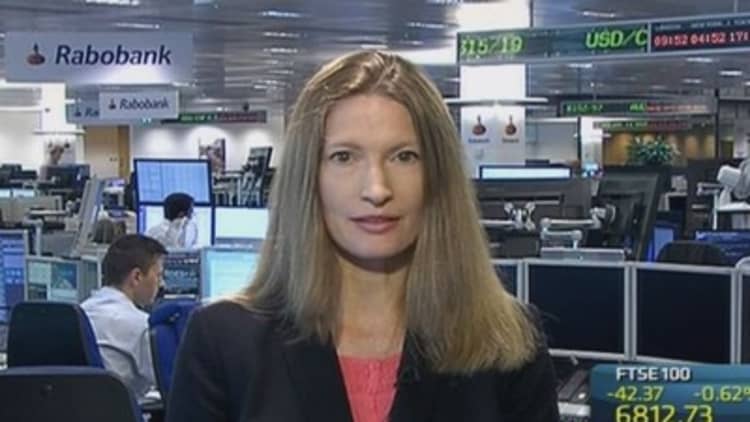Investors would be mistaken to assume that the implications of the upcoming Scottish referendum are limited to the U.K., analysts told CNBC.
In a few weeks Scottish citizens will vote on whether they would like to be independent from the United Kingdom. Until recently, a 'no' vote was expected, but a Sunday Times poll published last weekend showed 51 percent of respondents would vote for independence.
Sterling fell 1.3 percent to a 10-month low against the dollar overnight and is down around 3 percent month-to-date.
Read More
If Scotland were to divorce the U.K. there could be broad implications for global financial markets, according to Evan Lucas, market strategist at IG.
"So far it's only affected stocks and currencies with exposure to Scotland. However if Scotland were to leave the U.K., all bets are off, and there are plenty of 'what if' scenarios... we simply can't predict how big the fallout would be," said Lucas.
A vote to break away would lead to negotiations on whether Scotland keeps the pound as its currency, threatening the monetary union. Furthermore, the U.K.'s current account deficit would increase substantially if it lost 90 percent of its oil and gas assets, which are Scottish owned.
Read MoreScotland: Do the Ayes have it?

Asia isn't immune
"It will impact Asia, the tricky thing will be how to quantify it - right now it is as much of a binary risk rather than a tail risk," said Vishnu Varathan, market economist at Mizuho Corporate Bank.
A potential break-up of the U.K. could impact Asian investments in two ways, Varathan said.
"If you get any fluctuation in gilt yields, that will have a knock-on effect on yields across the global markets," he said.
Read MoreSupporters of Scottish independence take narrow poll lead for first time
"Also many Asian investors have exposure to U.K. and Scottish-based financial institutions from asset managers to banks to insurers, while these institutions also hold Asian assets, so they may divest to cover positions too," he added.
U.K. government bond yields have traded lower recently on expectations that much of Scotland's financial services industry would relocate to London, but Varathan said gilt yields could spike if a 'yes' vote occurs and depending on how assets and liabilities are split.
"If the fiscal burden for what remains of the U.K. goes a lot higher, that could push yields up as markets would expect more bond supply to come on to the market because of the higher debt obligations vis-à-vis the augmented GDP (gross domestic product) of the U.K.," said Varathan.
"Durable impact will be difficult to pin down until we get further clarity, but in the meantime the uncertainty will play out as sterling weakness and weaker markets in Asia as well, so we could see equities coming off and bond yields coming off," he added.
Read MoreScottish independence lands on traders' radar
Another implication from a 'yes' vote could be that domiciled entities in Scotland may have to look offshore, as funds would likely exit the U.K., IG's Lucas said: "Banks may find themselves looking for a new place to domicile. Singapore, for example, would be a very attractive place for Asian-facing U.K. business."
Ahead of the vote, stocks, currencies and equities with exposure to Scotland are expected to continue weakening, Lucas said, especially with two more opinion polls due before the vote.
Among companies to watch Lucas flagged National Australia Bank because of its exposure to Scotland through Clydesdale Bank, along with Royal Bank of Scotland, Standard Life, Varr, Weir Group and Aberdeen Asset Management.


